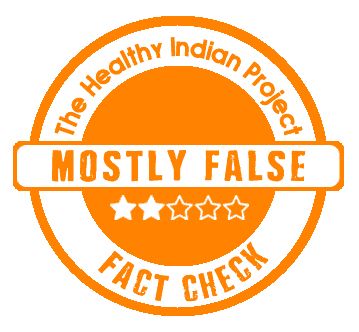Last Updated on August 23, 2023 by Neelam Singh
Quick Take
A social media post claims you should stop brushing your teeth as it harms you. It explains that the Nylon bristles used in the toothbrush release microplastics into the system. We fact-checked and found this claim to be Mostly False.

The Claim
An Instagram post with the caption, “What’s your opinion about this??…
#brushing #tooth #teeth #TeethCleaning #DentalHygiene #viral #trending #reelsindia” shares a video which states that one should stop brushing your teeth with a toothbrush as it releases microplastics in the body. It can be extremely harmful to the body.

Fact Check
Why is it important to brush your teeth?
Brushing your teeth is essential for maintaining good oral hygiene and promoting overall health. It removes plaque which is a sticky film of bacteria that can lead to cavities and gum disease. Brushing also freshens breath by removing food particles and bacteria to avoid bad breath. However, it does not mean that tooth brushing reverses tooth decay.
One of the most important types of toothpaste called Fluoride toothpaste, strengthens tooth enamel, which can prevent cavities. It also prevents gum disease by removing plaque and bacteria that can cause inflammation and infection in the gums. Poor oral health can cause various health problems, including heart disease, stroke, and diabetes, so regular brushing is essential.
Does toothbrushing release microplastics in the body?
Not exactly. There is no scientific evidence to suggest that toothbrushing releases microplastics into the body. However, it is possible that some microplastics could be ingested or inhaled during the act of brushing as research has shown that certain kinds of toothpaste have been found to be laden with microplastics. It is not clear how much of a risk this poses to human health. Some studies have shown that microplastics can cause inflammation and damage to cells in the body. Other researches show that it can cause a variety of side effects on human health.
The only possible rationale behind any sort of microplastic ingestion could be that toothbrushes with nylon bristles can shed tiny plastic particles over time due to abrasion and wear. These particles could potentially be ingested or inhaled during the brushing process, but the extent to which this happens and the potential health implications are not well understood and require further research.
Even though it is true that toothbrushes are non-biodegradable and they contain microplastics, more research is needed to understand the long-term health effects of exposure to microplastics through toothbrushing.
Is brushing your teeth with a toothbrush harmful?
No. Brushing your teeth with a toothbrush is not harmful when done correctly. In fact, it’s a fundamental practice for maintaining good oral health. Toothbrushes offer mechanical cleaning by physically removing food particles, plaque, and bacteria from teeth and gums. Their accessibility and convenience make them easy to incorporate into daily routines, while their targeted design allows for thorough cleaning in hard-to-reach areas. Toothbrushes, when combined with fluoride toothpaste, aid in distributing fluoride for enamel strength and cavity prevention. The controlled pressure during brushing ensures proper cleaning without harming sensitive areas. Particularly important for children’s dental education, toothbrushes establish lifelong oral hygiene habits. While other methods complement oral care, toothbrushes remain a cornerstone for daily plaque removal as it removes plaque from all the surfaces of your teeth, including the areas that are difficult to reach with food alone. Additionally, toothbrushing prevents gum disease and maintains good overall oral health.
It is better to brush your teeth twice a day for at least two minutes each time. Just remember to use a gentle technique, a good quality toothbrush, and follow a consistent oral care routine to keep your teeth and gums in the best possible condition Also, it is beneficial to visit your dentist regularly for professional cleanings and check-ups.
Disclaimer: Medical Science is an ever evolving field. We strive to keep this page updated. In case you notice any discrepancy in the content, please inform us at [email protected]. You can futher read our Correction Policy here. Never disregard professional medical advice or delay seeking medical treatment because of something you have read on or accessed through this website or it's social media channels. Read our Full Disclaimer Here for further information.

